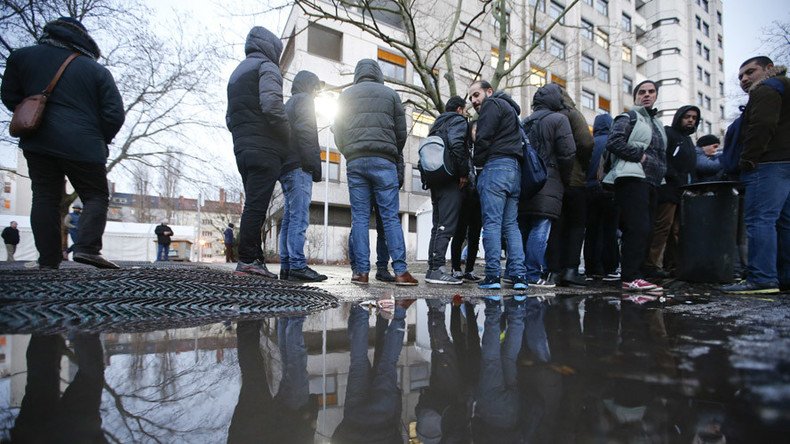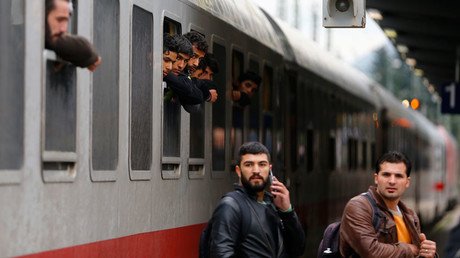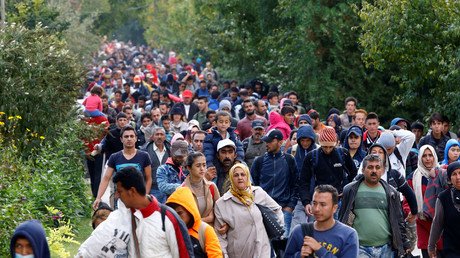ISIS sleepers 'may have arrived as refugees’ in Germany, ready for action – top intel official

Hit squads linked with ISIS terrorists might have infiltrated Germany camouflaged as refugees, the head of Bavaria’s intelligence service warns. citing “irrefutable evidence” of planned attacks in the country in the wake of recent assaults by migrants.
“The risk is abstract, but very high that we have hit squads and sleeper cells," in Germany, Manfred Hauser, vice-president of Bavaria’s department of the Office for the Protection of Constitution (BfV) told the BBC radio 4.
His agency is now looking into hundreds of potential cases of terrorists who made their way to Germany disguised as refugees.
"We have substantial reports that among the refugees are hit squads," Hauser claimed. BfV is getting the information from various sources, he added, including from interviews with asylum seekers arriving in the country.
The risk of terror attacks by the sleepers is “very high” according to the official. The BfV has “irrefutable evidence that there is an ISIS command structure that makes an attack in Germany highly possible."
The Federal chief of BfV Hans-Georg Maassen said in February that he had “over 100 tip-offs” on ISIS (Formerly known as IS, ISIS/ISIL) terrorists in Germany who pretended to be asylum seekers.
On Thursday, Germany’s Interior Minister Thomas de Maizeire came out with proposals on boosting anti-terror measures inside the country. As part of the plan the official said that “deporting of criminal refugees” should be made easier.
Earlier in August the President of the German Police Union Rainer Wendt has called to thoroughly check “all refugees” arriving in the country.
Meanwhile, Germany has intensified its attempts to trace down potential terrorist cells on its soil. On August 5 police arrested a Syrian refugee over potential links to planning a terrorist act at the start of the national football season.Media initially reported that “the man was a high-ranking IS commander” but law enforcers later did not confirm that.
On Wednesday police raided several alleged “hotspots” of Islamists in the Federal states of Nordrhein-Westfalen und Niedersachsen, Suddeutsche Zeitung reports.
The law enforcers did not make any arrests but are now investigating three people who are suspected to be recruiters for the Islamic State.
The three men in question “are suspected of being members and supporters for the foreign terrorist organization Islamic State,” the media outlet cites police as saying.
In July this year Germany was shaken by three violent assaults committed by migrants, with dozens of people injured as a result. In two of the cases the assailants pledged allegiance to Islamic State.
Following the massacres, Bavaria’s Prime Minister Horst Seehoffer told reporters that “Islamist terrorism has arrived in Germany.” Echoing his comments the state’s Interior Minister Joachim Hermann urged tougher controls for asylum seekers and called for even more radical measures.
“A deportation into a war zone should not be taboo as well,” Hermann said, referring to refugees who committed crimes in Germany.
Last month Germany’s Federal Criminal Police (BKA) revealed that the body has information on 410 leads on possible terrorists among asylum seekers in Germany.
"Given the ongoing immigration to Germany, we must assume that there could be active and former members, supporters and sympathizers of terrorist organizations or Islamist-motivated war criminals among the refugees,” the BKA told the Neue Osnabruecker Zeitung.
EDITORIAL NOTE: The initial version of this article contained a Hauser quote from BBC Radio 4, which read: “We have to accept that we got hit squads and sleeper cells.” This was corrected upon an emailed request from BfV, saying that Hauser’s words had been mistranslated, and that he had actually said: “The risk is abstract, but very high that we have hit squads and sleeper cells here in Germany.”














